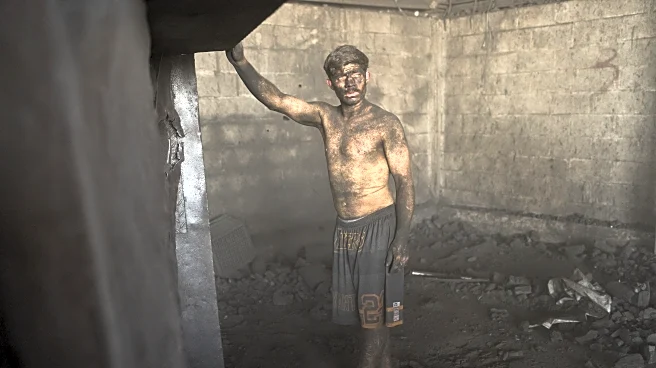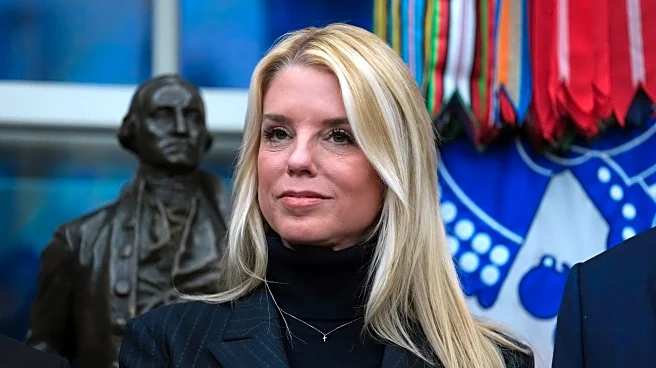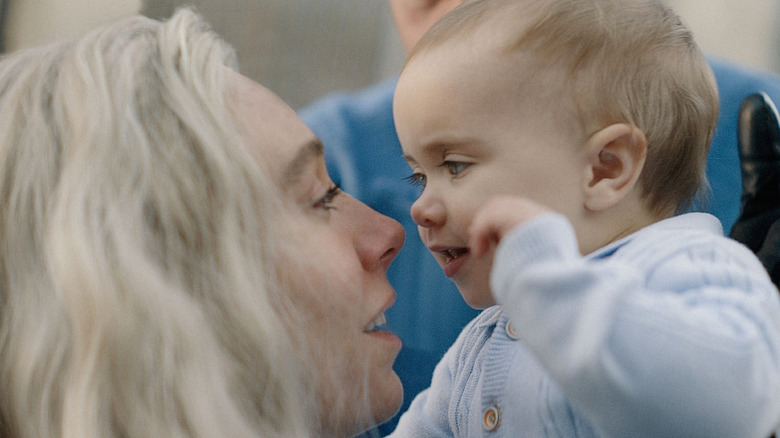
This article contains spoilers for "Fantastic Four: First Steps."
Screenplays are often home to some of the most poignant words of wisdom ever uttered by a human being -- pieces of dialogue that fundamentally
change the way audiences look at the world around them. Personally, I have an affinity for when those moments of brilliance pop up in the most unexpected places. The 1994 "Street Fighter" movie is treated like a punching bag, but the line, "For you, the day Bison graced your village was the most important day of your life. But for me, it was Tuesday," lives in my head rent-free. If there's any line that has reshaped my understanding of society, it's one from Agent K in "Men in Black." In the scene, Agent J questions the decision to keep aliens a secret from humanity, claiming, "People are smart. They can handle it." Agent J counters this by saying, "A person is smart. People are dumb, panicky, dangerous animals, and you know it."
It's this uncomfortable truth that lingers whenever a new wave of mass hysteria pops up as a result of fear, and one that "Fantastic Four: First Steps" elects to explore. The latest film in the Marvel Cinematic Universe follows Marvel's first family — married scientists Reed Richards, aka Mr. Fantastic (Pedro Pascal); Sue Storm, aka The Invisible Girl (Vanessa Kirby); Sue's kid brother Johnny Storm, aka The Human Torch (Joseph Quinn); and Reed's best friend Ben Grimm, aka The Thing (Ebon Moss-Bachrach). The quartet was altered by cosmic radiation during a space mission and returned to Earth as superheroes, turning them into beloved celebrities and protectors the world over. When Galactus threatens to eat Earth unless Reed and Sue give him their soon-to-be-born baby Franklin, the citizens of Earth respond like everyone's favorite meme of Michael Jordan.
That is, until Sue Storm delivers a moving speech, and the entire world suddenly decides to get on board and work together as a team like in "Independence Day." Ah, to live on Earth-828
Read more: Every Marvel Character Locked Up In The Raft
Earth-828 Is Not Like Ours
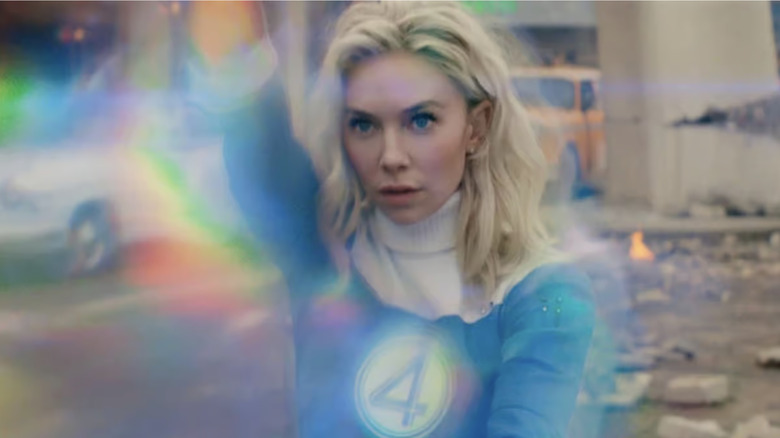
"Fantastic Four: First Steps" takes place on Earth-828, a retrofuturistic mid-century utopia that looks like a cross between "Mad Men" and "The Jetsons." Thanks to the scientific advancements of Reed Richards, their world looks a hell of a lot happier than our own. The Fantastic Four has essentially united all citizens of the planet, and everyone is coexisting in harmony. Most threats are those that come from faraway worlds, and those from within are swiftly dealt with. Hell, even "The Mole Man" Harvey Rupert Elder (Paul Walter Hauser) is happily ruling Subterranea beneath the New York City streets and minding his own business. But "First Steps" sees how this world responds when faced with a threat that cannot be defeated by peaceful negotiation, or even four modified humans with superpowers.
Galactus has always been one of the biggest baddies in the world of Marvel Comics: a cosmic entity who consumes planets to sustain his life force. The Silver Surfer (Julia Garner) became one of the Heralds of Galactus in exchange for his sparing of her own planet, and is forever plagued with the burden of being a harbinger of death. As otherworldly as Galactus' threat is presented, it's an anxiety no different than the ones we experience daily with the increased presence of fascism, climate change, war, genocide, poverty, and oppression. The planet is in danger, society is eating itself, and if we don't figure out how to work together, we're going to self-destruct without the presence of a planet-eating God. The citizens of Earth-828 respond as expected when they learn that Galactus will spare their planet if Reed and Sue give him baby Franklin, because no matter how enlightened they seem compared to us on Earth-1218, fear still brings out our most primal instincts for survival.
They are enraged with the Fantastic Four, protest outside of their home, and call them selfish for choosing to save the child, thereby putting the rest of them in mortal danger. Reed Richards tries to mediate with science and reason, with impassioned speeches, or hiding out inside the safety of the Baxter Building, but all of his tactics prove futile. Sue Storm decides to come face to face with her scared community, bringing baby Franklin with her, and chooses not to plead, but to validate their fears and speak to them on an even playing field.
And it works.
Fantastic Four: First Steps Believes Humans Are Better Than We Are
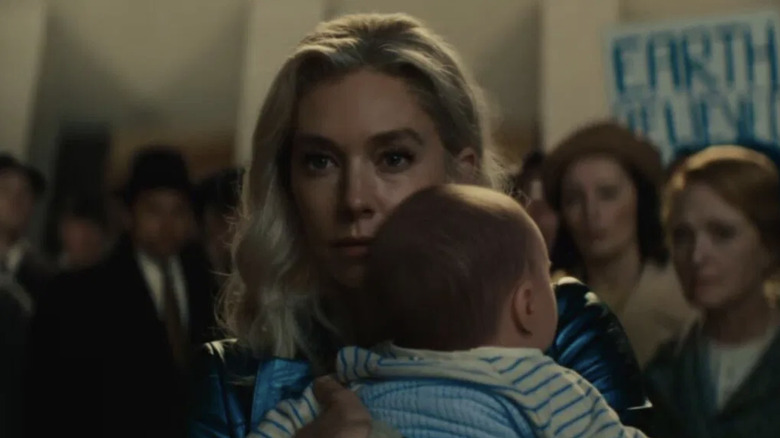
By the very design of her powers, Sue Storm is not an offensive player. Her invisibility and ability to create force fields naturally set her up to be a defensive or even passive contributor. When she speaks to the public, she isn't booming with a powerful declaration like Captain America explaining the price of freedom or Tony Stark revealing that he's Iron Man. She tells her community that she views them as family, and that "Family is about fighting for something bigger than yourself." It's a simple message, but one that the angry protestors buy into completely and immediately ... because the humans of Earth-828, while still the same dumb, panicky, dangerous animals as us, are better than we are.
The misogyny present in superhero fandoms is rampant and insidious. Even when female characters are coded as masculine as possible and behave nearly identically to their male counterparts, the fact that they're women is enough for people to completely check out of the movie or actively contribute to a film's downfall ... and that's just the hatred on display when discussing fictional women. In our reality, Earth-1218, men see powerful women as threats. During the most recent presidential election, pundits were still parroting the tired, sexist trope that women are too "emotional" to be leaders, and we're seeing an increasing number of children who are conditioned to hate women and girls so much that they become deadly.
Obviously, a superhero movie made under the Disney umbrella isn't going to kill a baby for the plot, so the audience is never meant to fear that a terrified person is going to scale the Baxter Building and sacrifice Franklin to Galactus. It's not "convenient for the plot" that the world got on board with Reed Richards' plan to move Earth away from Galactus (and later, Galactus away from Earth) because society actually listened to a woman — a mother — and didn't second-guess her intentions. It's a criticism of our own world for making such a simple solution seem like an impossibility. We don't have to exist like this. Things can and should be better for us all.
We just have to put our B.S. aside, stop being so afraid, and take the first step.
If you're looking for the easiest way to keep up with all the major movie and TV news, why not sign up to our free newsletter?
Read the original article on SlashFilm.


